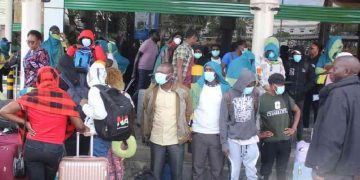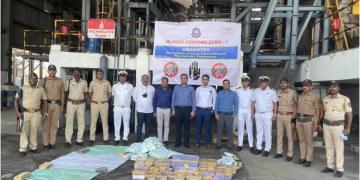Masked, silent, and visibly shaken, a group of Kenyans returned home on Saturday after a nightmare stint in Myanmar, where they were trafficked and forced to work in telecom scam centres under inhumane conditions.
The returnees, rescued after months of captivity, described their ordeal in what they termed as “hell on earth,” a detention-like experience marked by abuse, coercion, and trauma. Many had been lured with promises of high-paying jobs in Thailand, only to be smuggled across the border into conflict-ridden Myanmar.
Myanmar has been gripped by civil war since October 2023, with armed conflict and instability plunging the region into a humanitarian crisis. It is in this chaos that unsuspecting job seekers found themselves trapped in scam factories targeting global victims through online fraud, often involving cryptocurrency and fake real estate investments.
A total of 72 Kenyans returned on Saturday in two separate groups — 41 aboard Kenya Airways in the morning and 31 more in the afternoon aboard Ethiopian Airlines. The homecoming was met with relief and heartbreak in equal measure.
Among them was John Kiarie, a trained chef who thought he was heading to a culinary job in Thailand. Instead, he was forced into cybercrime operations in Myanmar.
“At first, you’re promised a good job. But when you get there, it’s nothing like what you were told,” said Kiarie. “If I had known what was waiting for me, I would never have gone. I ended up doing scamming work.”
He recounted how victims were intimidated and told they either had to work or pay back hefty sums — up to KSh700,000 — allegedly spent on trafficking them. With no salary, mounting fines, and constant pressure, many like Kiarie found themselves emotionally and physically broken.
“We were beaten, made to sit under the scorching sun, and fed poorly. The weather there is harsh, unbearable for people like us,” he added.
Kiarie’s voice cracked as he confessed to having scammed elderly victims, some aged 75 to 80, including those in hospitals.
“I feel so bad. That’s not the person I wanted to be,” he said. The most he ever earned from the grueling three months of work was 13,000 Baht (approx. KSh53,000), far below the promised 30,000 Baht, and that too came with fines and penalties.
Dan Karani, another returnee, left Kenya as a hopeful English tutor. He paid KSh200,000 for travel, entered Thailand on a tourist visa, and was picked up at the airport by what he described as a luxurious vehicle, a V8.
“I thought I had reached Canaan, the promised land,” Karani recalled. “But what I’ve gone through in the past four months is beyond words.”
He never got to teach. Instead, he was trafficked into Myanmar and forced into a job he neither signed up for nor understood, in a foreign land torn apart by war.
Despite the trauma, the returnees expressed deep gratitude to the Kenyan Ministry of Foreign Affairs, particularly Principal Secretary for Diaspora Affairs Roseline Njogu, who received them at the Jomo Kenyatta International Airport (JKIA) and played a central role in facilitating their rescue.
Authorities are now investigating how such trafficking networks are operating under the guise of overseas employment. The Ministry of Foreign Affairs has urged Kenyans to verify the legitimacy of foreign job offers and avoid using unofficial agents.
As these survivors begin the long road to recovery, their stories stand as a chilling reminder of the dangers lurking behind flashy job adverts and the dark world of human trafficking.









































